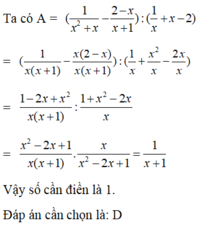Biết A = ( 1 x 2 + x − 2 − x x + 1 ) : ( 1 x + x − 2 ) = ... x + 1 . Điền biểu thức thích hợp vào ô trống
A. 1 x + 1
B. x+ 1
C. x
D. 1
Hãy nhập câu hỏi của bạn vào đây, nếu là tài khoản VIP, bạn sẽ được ưu tiên trả lời.



b: Ta có: \(\left(x-2\right)^3-x^2\left(x-6\right)=4\)
\(\Leftrightarrow x^3-6x^2+12x-8-x^3+6x^2=4\)
\(\Leftrightarrow12x=12\)
hay x=2
d: Ta có: \(3\left(x-1\right)^2-3x\left(x-5\right)=1\)
\(\Leftrightarrow3x^2-6x+3-3x^2+15x=1\)
\(\Leftrightarrow9x=-2\)
hay \(x=-\dfrac{2}{9}\)

a,(x+2)(x+3)-(x+2)(x+5)=6
<=>(x+2)(x+3-x-5)=6
<=>(x+2).-2=6
<=>x+2=-3
<=>x=-3-2=-5
k rồi mình làm tiếp cho

a) (x+2)(x+1-x+1)=0
\(\Leftrightarrow\) (x+2)\(\times\) 2 = 0
\(\)\(\Leftrightarrow\)x+2 =0\(\Leftrightarrow\) x =-2
b) \(x^3-2x^2+x^2+x-2\)
\(\Leftrightarrow x^3-x^2+x-2=0\)

a: \(E=\dfrac{x\left(x+1\right)}{\left(x-1\right)^2}:\left(\dfrac{x+1}{x}+\dfrac{1}{x-1}+\dfrac{2-x^2}{x\left(x-1\right)}\right)\)
\(=\dfrac{x\left(x+1\right)}{\left(x-1\right)^2}:\dfrac{x^2-1+x+2-x^2}{x\left(x-1\right)}\)
\(=\dfrac{x\left(x+1\right)}{\left(x-1\right)^2}\cdot\dfrac{x\left(x-1\right)}{x+1}=\dfrac{x^2}{x-1}\)
b: |x-3|=2
=>x-3=2 hoặc x-3=-2
=>x=5(nhận) hoặc x=1(loại)
Khi x=5 thì \(E=\dfrac{5^2}{5-1}=\dfrac{25}{4}\)
c: Để E=1/2 thì \(\dfrac{x^2}{x-1}=\dfrac{1}{2}\)
\(\Leftrightarrow2x^2-x+1=0\)
hay \(x\in\varnothing\)
f) \(A=\dfrac{x^2}{x-1}=\dfrac{x^2-x+x-1+1}{x-1}=\dfrac{x\left(x-1\right)+x-1+1}{x-1}=x+1+\dfrac{1}{x-1}=x-1+\dfrac{1}{x-1}+2\ge2\sqrt{\left(x-1\right).\dfrac{1}{x-1}}+2=4\)\(A=4\Leftrightarrow x=2\)
-Vậy \(A_{min}=4\)

a: Ta có: \(\dfrac{x+2}{5}=\dfrac{1}{x-2}\)
\(\Leftrightarrow x^2-4=5\)
\(\Leftrightarrow x^2=9\)
hay \(x\in\left\{3;-3\right\}\)
b: Ta có: \(\dfrac{x}{x+1}=\dfrac{x+5}{x+7}\)
\(\Leftrightarrow x^2+6x+5=x^2+7x\)
\(\Leftrightarrow6x-7x=-5\)
hay x=5
c: Ta có: \(\dfrac{x-1}{x+2}=\dfrac{x-2}{x+3}\)
\(\Leftrightarrow x^2+2x-3=x^2-4\)
\(\Leftrightarrow2x=-1\)
hay \(x=-\dfrac{1}{2}\)

1
\(\left(x-2\right):2.3=6\)
\(\Leftrightarrow\left(x-2\right):2=2\)
\(\Leftrightarrow\left(x-2\right)=4\)
\(\Leftrightarrow x=4+2=6\)
c) ta có
\(\left[\left(2x+1\right)+1\right]m:2=625\)
\(\Leftrightarrow\left[\left(2x+1\right)+1\right]\left\{\left[\left(2x+1\right)-1\right]:2+1\right\}=1250\)
\(\Leftrightarrow\left(2x+1\right)^2+1-1:2+1=1250\)
\(\Leftrightarrow\left(2x+1\right)^2+1-2+1=1250\)
\(\Leftrightarrow\left(2x+1\right)^2+1-2=1249\)
\(\Leftrightarrow\left(2x+1\right)^2+1=1251\)
\(\Leftrightarrow\left(2x+1\right)^2=1250\)
...
2
\(\left(x-\frac{1}{2}\right).\frac{5}{3}=\frac{7}{4}-\frac{1}{2}\)
\(\Leftrightarrow\left(x-\frac{1}{2}\right).\frac{5}{3}=\frac{5}{4}\)
\(\Leftrightarrow\left(x-\frac{1}{2}\right)=\frac{5}{4}:\frac{5}{3}\)
\(\Leftrightarrow\left(x-\frac{1}{2}\right)=\frac{5}{4}.\frac{3}{5}\)
\(\Leftrightarrow x-\frac{1}{2}=\frac{3}{4}\)
\(\Leftrightarrow x=\frac{3}{4}+\frac{1}{2}=\frac{5}{4}\)

Bạn nên viết lại đề bài cho sáng sủa, rõ ràng để người đọc dễ hiểu hơn.
f: =>4(x^2+4x-5)-x^2-7x-10=3(x^2+x-2)
=>4x^2+16x-20-x^2-7x-10-3x^2-3x+6=0
=>6x-24=0
=>x=4
e: =>8x+16-5x^2-10x+4(x^2-x-2)=4-x^2
=>-5x^2-2x+16+4x^2-4x-8=4-x^2
=>-6x+8=4
=>-6x=-4
=>x=2/3
d: =>2x^2+3x^2-3=5x^2+5x
=>5x=-3
=>x=-3/5
b: =>2x^2-8x+3x-12+x^2-7x+10=3x^2-12x-5x+20
=>-12x-2=-17x+20
=>5x=22
=>x=22/5

Câu 1:
b: ĐKXĐ: \(x\notin\left\{3;-3\right\}\)
\(\dfrac{1}{x-3}-\dfrac{1}{x+3}+\dfrac{2x}{9-x^2}\)
\(=\dfrac{1}{x-3}-\dfrac{1}{x+3}-\dfrac{2x}{\left(x-3\right)\left(x+3\right)}\)
\(=\dfrac{x+3-x+3-2x}{\left(x-3\right)\left(x+3\right)}=\dfrac{-2x+6}{\left(x-3\right)\left(x+3\right)}\)
\(=\dfrac{-2\left(x-3\right)}{\left(x-3\right)\left(x+3\right)}=-\dfrac{2}{x+3}\)
c: ĐKXĐ: \(x\notin\left\{2;0\right\}\)
Sửa đề: \(\dfrac{x+1}{x-2}+\dfrac{4-5x}{x^3+4x}:\dfrac{x-2}{x^2+4}\)
\(=\dfrac{x+1}{x-2}+\dfrac{4-5x}{x\left(x^2+4\right)}\cdot\dfrac{x^2+4}{x-2}\)
\(=\dfrac{x+1}{x-2}+\dfrac{4-5x}{x\left(x-2\right)}\)
\(=\dfrac{x\left(x+1\right)+4-5x}{x\left(x-2\right)}=\dfrac{x^2+x-5x+4}{x\left(x-2\right)}\)
\(=\dfrac{x^2-4x+4}{x\left(x-2\right)}=\dfrac{\left(x-2\right)^2}{x\left(x-2\right)}=\dfrac{x-2}{x}\)

............................. Đấng Ed bảo ko chắc cho lắm nên sai thì sr nhé -,-
\(a)\)\(\left|x-1\right|+\left|x-2\right|+...+\left|x-8\right|=22\)
+) Với \(x\ge8\) ta có :
\(x-1+x-2+...+x-8=22\)
\(\Leftrightarrow\)\(8x-36=22\)
\(\Leftrightarrow\)\(x=\frac{29}{4}\)( không thỏa mãn )
+) Với \(x< 1\) ta có :
\(1-x+2-x+...+8-x=22\)
\(\Leftrightarrow\)\(36-8x=22\)
\(\Leftrightarrow\)\(x=\frac{7}{4}\) ( không thỏa mãn )
Vậy không có x thỏa mãn đề bài
\(b)\)\(\left|x-1\right|+\left|x-2\right|+\left|x-3\right|+...+\left|x-100\right|=2500\)
+) Với \(x\ge100\) ta có :
\(x-1+x-2+x-3+...+x-100=2500\)
\(\Leftrightarrow\)\(100x-5050=2500\)
\(\Leftrightarrow\)\(x=\frac{151}{2}\) ( không thỏa mãn )
+) Với \(x< 1\) ta có :
\(1-x+2-x+3-x+...+100-x=2500\)
\(\Leftrightarrow\)\(5050-100x=2500\)
\(\Leftrightarrow\)\(x=\frac{51}{2}\) ( không thỏa mãn )
Vậy không có x thỏa mãn đề bài
Bài 2 :
+) Với \(x\ge-1\) ta có :
\(x+1+x+2+...+x+100=605x\)
\(\Leftrightarrow\)\(100x+5050=605x\)
\(\Leftrightarrow\)\(x=10\) ( thỏa mãn )
+) Với \(x< -100\) ta có :
\(-x-1-x-2-...-x-100=605x\)
\(\Leftrightarrow\)\(-100x-5050=605x\)
\(\Leftrightarrow\)\(x=\frac{-1010}{141}\) ( không thỏa mãn )
Vậy \(x=10\)
~ Đấng phắn ~